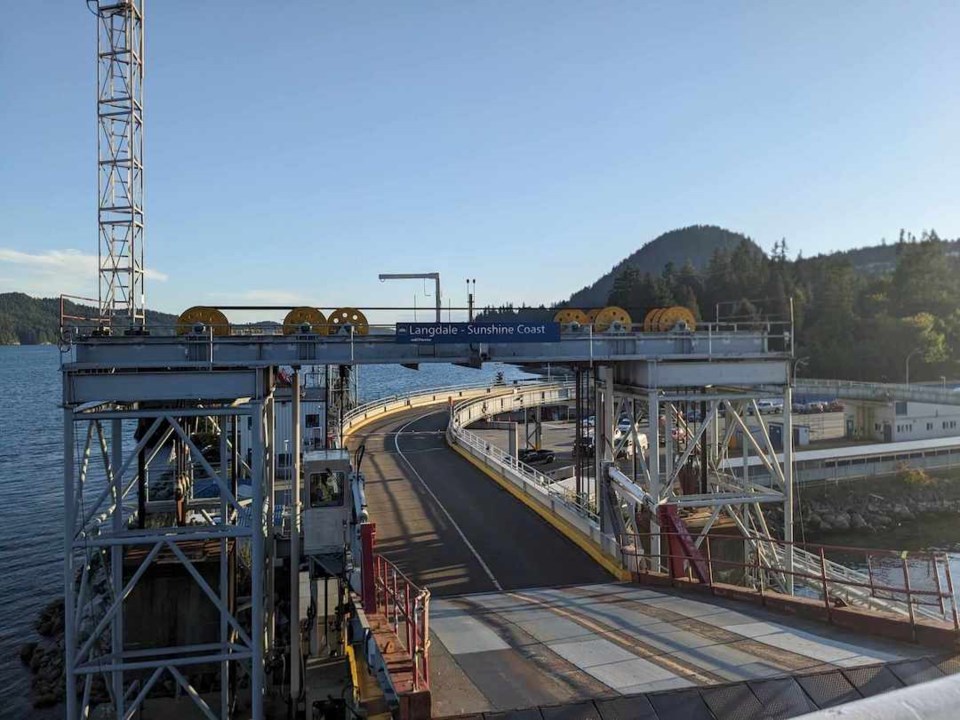An interactive community workshop to review and prioritize recent feedback on ferry service, takes place June 17 in Sechelt.
It’s the first in-person community event hosted by BC Ferries (BCF) on the Sunshine Coast, since the ferry corporation moved meetings online last fall due to what was described as “aggressive, threatening and abusive behaviour” at a public meeting in Gibsons.
More than 40 people attended a tension-filled meeting with the Southern Sunshine Coast Ferry Advisory Committee (FAC) at Gibsons Public Market last September, following the cancellation of 32 sailings over two months. At the meeting, a long-time Sunshine Coast community member said they blamed “a lot of the problems” on reservations and threatened to “take a gun” to BC Ferries if they increased the number of reservation spots above 50 per cent.
Following the meeting, BC Ferries vice-president of strategy and community engagement, Brian Anderson, sent a letter to FAC chairs suspending in-person events while it implemented a safety and security plan for community engagement activities.
In an email to the Coast Reporter, Ritinder Matthew, director of media and issues for BC Ferries, said after the incident last fall, BC Ferries took time to carefully review and improve its safety and security procedures to ensure everyone’s well-being.
“Over the past several months, we have focused on initiatives that ensure our community events are safe and respectful,” Matthew wrote. “These efforts highlight our dedication to fostering positive and meaningful dialogue with the communities we serve.”
Those initiatives include establishing safety and security policies for public events that align with WorkSafe BC requirements, rolling out new mandatory respectful workplace policy and training across the company, training for staff who regularly attend public events, reviewing the FAC terms of reference and establishing new codes of conduct, developing engagement plans that allow staff to address outstanding feedback, and helping them reset their conversations with FACs and communities.
Matthew added BC Ferries is implementing new protocols for public events, including RSVPs, updated sign-in procedures and a code of conduct for all attendees.
Southern Sunshine Coast Ferry Advisory Committee chair Diana Mumford believes that particular security issue last September was a “one-off event.”
“Community residents and FAC members were extremely frustrated with the negative impact on Route 3 service from the mechanical issues on the Coastal Renaissance,” says Mumford. “I am hopeful that our community will provide their concerns to BC Ferries in a respectful manner and that BC Ferries has taken extra steps of security for their employees.”
Mumford notes this BCF workshop is a new process, so she had few details to share as of May 31.
“What we do know is that BC Ferries is planning to discuss priority issues for our communities during the engagement process. At our FAC meetings, we always have a list of action items, which are concerns we have heard from the community,” says Mumford. “Those action items have been discussed many times and we had a recent FAC meeting where we looked at short and long-term issues and prioritized that short-term list.”
Those short-term items include:
- Traffic management and lack of amenities at Horseshoe Bay Terminal above the toll booth
- Communication during delays and cancellations
- Service improvements of on-time performance, overloads, and the extension of the peak season to encompass shoulder seasons (spring break to the end of June and beginning of September to Thanksgiving)
- Managing traffic and safety at Langdale Terminal during high-volume sailings
- Customer access to Horseshoe Bay washrooms at main terminal building
- Accessibility for ferry users, particularly those with disabilities, health issues and mobility challenges
Mumford is pleased BCF in-person events are back on the agenda for the Sunshine Coast.
“All members of our ferry advisory committee and the 12 other ferry advisory committees are relieved that there is again some opportunity for BC Ferries and the communities to engage in conversations about the ferry service for ferry-dependent communities in Coastal B.C.,” says Mumford. “Reliable and essential ferry service is vital to the economic and social prosperity of our coastal communities.”
She adds, frank yet respectful dialogue between BCF, the FACs and community residents is vital in order to move forward.
“Residents need to remember that change takes time and some issues are very large and costly and cannot be accomplished by next week,” she says. “The issues may also not be under the purview of BC Ferries, instead the transportation ministry. BC Ferries needs to acknowledge the frustration of ferry users and work with communities to share steps being taken towards improved service.”
The workshop will begin with a short presentation, followed by two interactive sessions, which will ask participants to help BCF ensure feedback captured from the FAC and community is complete and accurate, and prioritize feedback based on what is most important to the community.
BCF recommends to get the most from the session, participants should stay for the entire workshop, but notes community members are also welcome to drop in. For those who can’t attend, there will be an online engagement component hosted on the project’s web page, which will include the workshop input.
The interactive community workshop takes place Monday, June 17, from 6 to 7:30 p.m. in Sechelt. For more information and to RSVP for the workshop, visit bcferriesprojects.ca/southern-sunshine-coast. The exact location of the workshop will be shared with those who register for the event.
– With files from Jordan Copp, Carla Wilson


